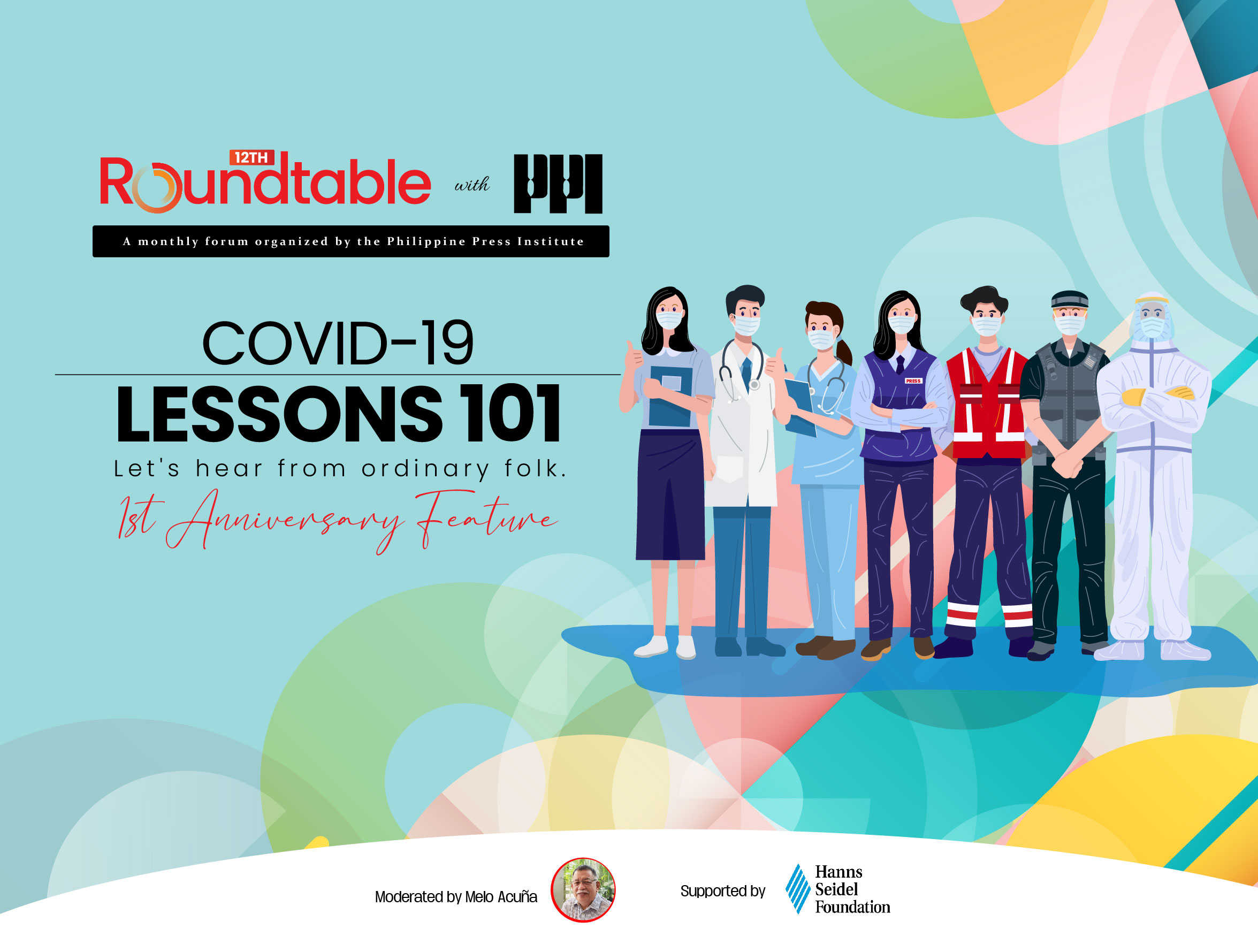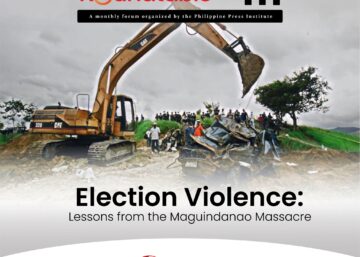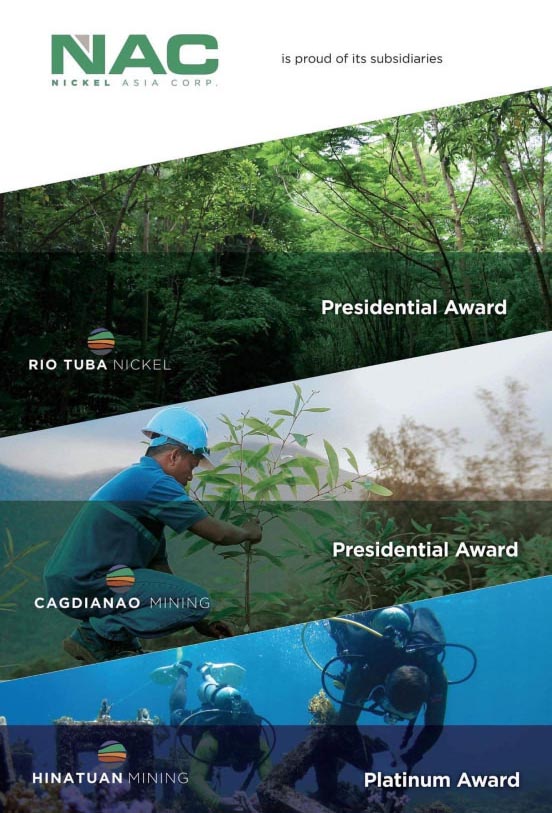COVID-19 altered lives; Filipinos continue to manifest resiliency
MANILA – In any given year, there will always be at least 20 tropical cyclones that enter the country’s area of responsibility with eight or nine of them crossing the archipelago, bringing with them intense rains, flash floods and at times landslides.
From 1950, it has been reported 4,800 people died due to earthquakes with 21 of which caused tsunamis which claimed lives and damage to both public and private properties.
In the countryside, separatist movements and ideologically-driven groups have made their presence felt. All these resulted in loss of lives and limbs from all sides, the severest brunt of which has always been felt by the non-combatants.
However, the COVID-19 pandemic brought untold misery to the country’s most vulnerable sectors, from minimum-wage earners to businessmen and professionals, the urban poor, government workers and even journalists.
At the recent Roundtable with Philippine Press Institute under the auspices of Hanns Seidel Foundation, government workers, professionals and a journalist shared their experiences in the performance of their usual routines.
Zamboanga City-based news reporter Julie Alipala, long exposed to military conflict said COVID-19 proved to be more difficult than the usual events she has attended to over the years.
“Before I used to go out almost every day, now I go out like once a week, dahil hindi natin alam kung ano yung kinakaharap natin, hindi mo alam kung sina yung mga nakakausap mo baka carrier ba,” she said.
Ms. Alipala admitted she’s even finding it hard to use public transportation because she wouldn’t know who among her fellow passengers are virus positive. She finds it hard to do interviews.
However, she said she copes with the requirements using technology, from mobile phones to short message service and emails to check on her news sources.
Having a directory of news sources was to her advantage, she added. Julie says she no longer opens her social media accounts at night so as not be depressed seeing lighted candles in her friends’ profiles due to COVID-19-triggered deaths in their families.
A municipal social worker based in Buenavista, Quezon, Ms. Annie Arlan said she and her fellow social workers are aware of the difficulties faced by Filipino families across the country.
She is currently the President of the Association of Local Government Social Workers.
“The pandemic has further complicated the problems faced by the Filipino families. We have noticed an increase in cases of violence against women and incestuous rapes,” she said.
She added social workers work closely with health officials, municipal officials from the mayors, vice mayors to councilors as well as non-government organizations to attend to the multi-faceted problems among their townmates.
Ms. Arlan said it is the social workers who need to attend to problems brought before them yet they still have their own family concerns upon reaching their homes.
A Sanitation Worker from Barangay Tandang Sora in Quezon City, Joyce Versabal, a COVID-19 survivor herself said she continues to sanitize areas where COVID-19 positive cases have come from.
“We disinfect homes clad in our personal protective equipment (PPEs) along with face masks and face shields. After our routine, we disinfect ourselves so as not to endanger our own families,” she said. She got COVID-19 in August last year and has affected her family too.
“Siguro po yung nerbyos natural lang po yun, pagka-dedicated ka po sa trabaho mo, eh hindi mo na po iisipin yun kasi kung panghihinaan po kayo ng loob, sino po yung kikilos para sa mga mamamayan?” she hastened to add.
She credits her barangay chairman for risking his health in attending to his constituents’ needs.
“If he can do it, why can’t I?” she asks.
However, despite her close call, she still continues to work as Sanitation Worker and maintained her jolly spirit.
Over in Barangay Poblacion, Burgos town in Ilocos Norte, Barangay Chairman Joegie B. Jimenez says despite all the stress and the challenging times brought by COVID-19 pandemic, they all learned how to cope with the difficulties.
“Natuto ang mga tao sa amin ng kahalagahan ng disiplina sa pamamagitan ng koordinasyon sa pagitan ng local government unit at maging sa disaster risk reduction management councils,” Chairman Jimenez said.
He added executive orders from the provincial governor and town mayor are thoroughly discussed by the barangay council for easier implementation.
“We have no COVID-19 cases in our town because of the system we have put in place,” he added.
A registered nurse and actively participating in the activities of their national organization, Philippine Nurses Association Benjie Foscablo said at the start of the pandemic, he and his colleagues were beset with uncertainties and anxiety while working 12-16 hour shifts where almost all of them have been exposed to patients with COVID-19.
“It is an unseen ‘enemy’,” he said. He expressed fears his immediate family may also get infected due to his exposure to COVID-19 positive patients.
He added they are assigned to different wards where they attend to their patients religiously.
“We can be assigned anywhere in the hospital because nurses are always on call to serve and save lives. We are always at the frontline, so to speak,” he added.
Despite the lure of working abroad for higher pay and professional growth, Nars Benj believes he still has to work in the Philippines especially now that people need medical attention.
Ms. Eirene Villas is a public school teacher who attends to 40 or so basic education pupils and still finds time to teach his elementary school son with the blended learning scheme.
“I opted to work from home and limited my movement. My son, now in Grade 2 has his online classes,” she added. Teacher Eirene admits conflicts arise as her work demands full-time attention together with her son’s modules. She said her husband is a seafarer waiting for deployment now helps her in housekeeping.
She still finds time to personally check and follow-up on her students who have are not regularly attending to their virtual classes.
Teacher Eirene said she has already adjusted to the new routine after over a year of the pandemic in the country.
During the first quarter of 2020, even medical practitioners feared for their lives and safety due to COVID-19 pandemic.
Dr. Tina Alberto, a community doctor with Health Index Multispecialty Primary Health Care Clinic in Cavite province, said she knew of doctors who stopped their regular clinics due to the COVID-19 pandemic. Such situation brought problems for both doctors and patients alike.
“I feel sad for people who fail to see their doctors for diagnosis due to fears of COVID-19,” Dr. Alberto said.
A very basic concern is the possibility of getting the virus but Science dictates ways to prevent the spread of the deadly virus including use of face masks, frequent hand washing and social distancing.
Dr. Alberto said she and her colleagues have attended to their patients regularly and nobody has caught the virus.
This feature was presented during the 1st Anniversary Presentation of the Roundtable with Philippine Press Institute sponsored by the Hanns Seidel Foundation.
As the government reports the arrival of over 10,000 doses of vaccines and as they try to deliver them to the countryside and against a backdrop of COVID-19 variants, the resource persons we featured continue to manifest their outstanding commitment to work, high level of professionalism and dedication to service. (Melo M. Acuña)









